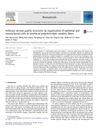 4 citations,
August 2021 in “The Malaysian journal of medical sciences/The Malaysian Journal of Medical Science”
4 citations,
August 2021 in “The Malaysian journal of medical sciences/The Malaysian Journal of Medical Science” Eating fewer calories improves the ability of stem cells to repair and renew the body in various tissues.
 179 citations,
July 2016 in “Nature Reviews Molecular Cell Biology”
179 citations,
July 2016 in “Nature Reviews Molecular Cell Biology” Epigenetic changes control how adult stem cells work and can lead to diseases like cancer if they go wrong.
10 citations,
June 2021 in “EMBO reports” When skin blisters, healing the wound is more important than growing hair, and certain stem cells mainly fix the blisters without helping hair growth.
 1 citations,
May 2021 in “Revista Eletrônica Acervo Científico”
1 citations,
May 2021 in “Revista Eletrônica Acervo Científico” The document concludes that more research is needed on treatments for hair loss in both men and women, especially on medication combinations and their benefits.
 April 2020 in “bioRxiv (Cold Spring Harbor Laboratory)”
April 2020 in “bioRxiv (Cold Spring Harbor Laboratory)” Skin healing from blisters can delay hair growth as stem cells focus on repairing skin over developing hair.
 82 citations,
February 2017 in “Cold Spring Harbor Perspectives in Biology”
82 citations,
February 2017 in “Cold Spring Harbor Perspectives in Biology” The TGF-β family helps control how cells change and move, affecting skin, hair, and organ development.
 3 citations,
June 2006 in “Expert Review of Dermatology”
3 citations,
June 2006 in “Expert Review of Dermatology” The document concludes that hair loss is complex, affects many people, has limited treatments, and requires more research on its causes and psychological impact.
 June 2022 in “bioRxiv (Cold Spring Harbor Laboratory)”
June 2022 in “bioRxiv (Cold Spring Harbor Laboratory)” ILC1-like cells can cause alopecia areata by attacking hair follicles.
3 citations,
May 2013 in “International journal of molecular sciences” Epidermal stem cells show promise for treating orthopedic injuries and diseases.
 67 citations,
January 2022 in “Theranostics”
67 citations,
January 2022 in “Theranostics” Advanced nanocarrier and microneedle drug delivery methods are more effective, safer, and less invasive for treating skin diseases.
 378 citations,
November 2011 in “Human reproduction update”
378 citations,
November 2011 in “Human reproduction update” Experts recommend using evidence-based methods to diagnose and treat hirsutism, focusing on symptoms and underlying causes.
 33 citations,
January 2018 in “The International Journal of Developmental Biology”
33 citations,
January 2018 in “The International Journal of Developmental Biology” Cell aging can be both good and bad for tissue repair.
 2 citations,
March 2021 in “Molecular Immunology”
2 citations,
March 2021 in “Molecular Immunology” Dermal macrophages might help regrow hair.
 11 citations,
June 2016 in “npj Regenerative Medicine”
11 citations,
June 2016 in “npj Regenerative Medicine” The symposium concluded that understanding how different species repair tissue and how this changes with age can help advance regenerative medicine.
 160 citations,
January 2017 in “Development”
160 citations,
January 2017 in “Development” Blood vessels and specific genes help turn cartilage into bone when bones heal.
 32 citations,
February 2017 in “Oncotarget”
32 citations,
February 2017 in “Oncotarget” Cellular senescence has both cancer-blocking and cancer-promoting effects, and targeting senescent cells may improve health and lifespan.
 April 2021 in “Journal of Investigative Dermatology”
April 2021 in “Journal of Investigative Dermatology” Leontopodium alpinum extract may help reduce hair shedding by keeping hair in the growth phase longer.
 May 2018 in “International journal of cell science & molecular biology”
May 2018 in “International journal of cell science & molecular biology” Early anti-aging hair treatments should focus on anti-inflammatory agents and promoting healthy hair growth cycles.
 318 citations,
January 2022 in “Signal Transduction and Targeted Therapy”
318 citations,
January 2022 in “Signal Transduction and Targeted Therapy” The Wnt/β-catenin pathway is important for body functions and diseases, and targeting it may treat conditions like cancer, but with safety challenges.
 40 citations,
June 2013 in “Biomaterials”
40 citations,
June 2013 in “Biomaterials” Scientists created 3D hair-like structures that could help study hair growth and test treatments.
 10 citations,
June 2019 in “Journal of Tissue Engineering and Regenerative Medicine”
10 citations,
June 2019 in “Journal of Tissue Engineering and Regenerative Medicine” Scientists successfully grew new hair follicles in regenerated mouse skin using mouse and human cells.
 1 citations,
November 2015 in “Indian Journal of Clinical Biochemistry”
1 citations,
November 2015 in “Indian Journal of Clinical Biochemistry” The conference presented findings on how vitamin D levels, genetic factors, and lifestyle choices like smoking and yoga affect various health conditions and diseases.
 77 citations,
July 2020 in “Journal of the European Academy of Dermatology and Venereology”
77 citations,
July 2020 in “Journal of the European Academy of Dermatology and Venereology” Environmental factors, hormones, nutrition, and stress all significantly affect skin health and aging.
 37 citations,
June 2021 in “Journal of the European Academy of Dermatology and Venereology”
37 citations,
June 2021 in “Journal of the European Academy of Dermatology and Venereology” Adult skin quickly reacts to short-term environmental and internal stress, leading to various skin issues and the need for protective measures.
12 citations,
June 2023 in “International Journal of Molecular Sciences” Innovative biomaterials show promise in healing chronic diabetic foot ulcers.
 4 citations,
September 2016 in “PubMed”
4 citations,
September 2016 in “PubMed” Using platelet-rich fibrin matrix with hair transplant techniques helps in hair regrowth in male baldness patients.
2 citations,
December 2023 in “International journal of molecular sciences” Understanding keratinization is crucial for treating skin conditions like ichthyoses and psoriasis.
 August 2023 in “International Journal of Molecular Sciences”
August 2023 in “International Journal of Molecular Sciences” Liposomes show promise for delivering CRISPR for gene editing but face challenges like delivery efficiency and safety concerns.
April 2024 in “International journal of molecular sciences” Light-based treatment, Photobiomodulation, shows promise for non-invasive skin therapy with few side effects.
 14 citations,
April 2020 in “Journal of Cosmetic Dermatology”
14 citations,
April 2020 in “Journal of Cosmetic Dermatology” QR678 treatments were more effective and comfortable for male hair loss than PRP treatments.

























